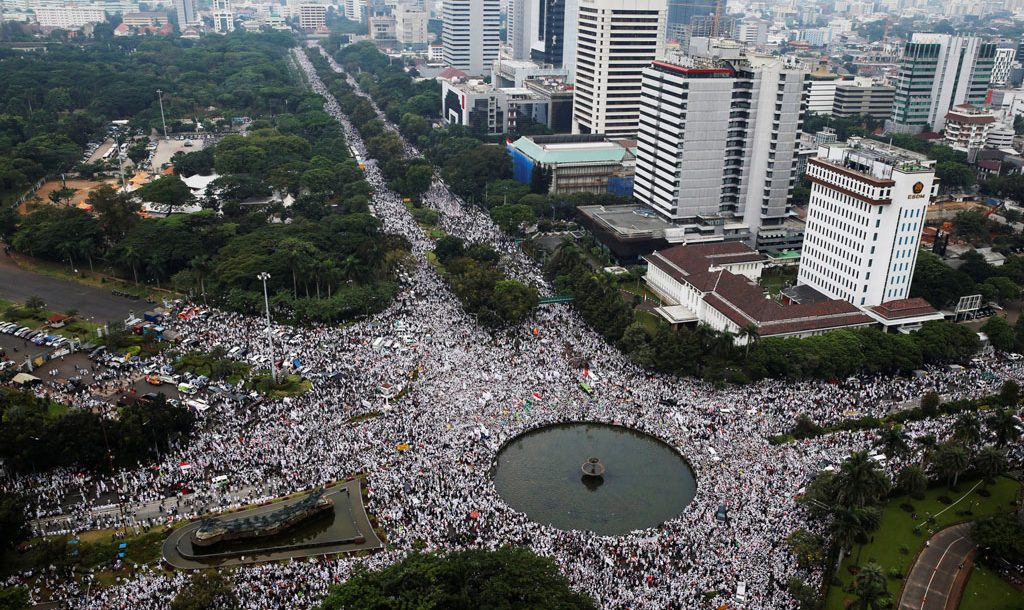In the aftermath of Jakarta’s 4 November anti-Ahok demonstration, Dwi Kwiswanto outlines what Indonesian political actors can learn. And if lessons go unheeded, the consequences are real and severe, he warns.
Two Fridays ago, a massive demonstration was held in the centre of Jakarta, with protesters demanding the arrest of reigning Governor Basuki Tjahaya Purnama, or Ahok, due to alleged blasphemy.
The protest, which drew anywhere between 150,000 to 200,000 people and also sparked riots, leaves a number of critical questions hanging in the air. Some have been quick to defend and rationalise the events on Friday 4 November, while others have been quite critical. Some even drew comparisons to the 2010 Arab Spring movement, which brought about the demise of oligarchs and dictatorships across Tunisia, Libya and Egypt, as well as reorienting those states’ political institutions (to a certain extent). These comparisons evoked tensions amid concerns whether a revolution similar to 1998 could re-occur.
Accusations of blasphemy emerged after a video of Ahok partially citing a Quran verse during his October visit to Kepulauan Seribu (the Thousand Islands regency north of Jakarta) went viral. The recording was accompanied by a transcript, later found to have unintentionally swapped a crucial word and which caused a major misinterpretation. This, however, did little to quell outcry.
The religious-movement-based demonstration comes at a significant moment in time for Indonesia.
Local elections for Jakarta’s Governor are taking place next year. Ahok is in competition with Anies Baswedan, previously reshuffled Minister of Education, and Agus Yudhoyono, the retiring Major from the National Army, who is also the son of former president Susilo Bambang Yudhoyono. It was rumoured that the demonstration was associated with the current gubernatorial campaign and that candidates may have purchased people power to oust political opponents like Ahok from the political arena. This remains unproven.
Despite the unpredictability and the uncertainty of the triggers behind the demonstration, what was most striking was the use of religion and ethnicity as political commodities to attack political actors. In this case Ahok, a non-Muslim and Chinese elite, represents the perfect minority combination and probably the least common characteristics in Indonesia’s Muslim majority politics.
In modern political practices, individual credibility and ability ought to factor above an individual’s background, religion or ethnicity. Yet, it would seem from the nature of the protests, Indonesia remains a politically immature state and democracy – and is quick to jump on the bandwagon of identity politics.
The consequences of such actions are real and dangerous.
Constitutionally, Indonesia is a secular state. Wielding the tools of blasphemy, sectarianism and racism brings about wider social frictions that are detrimental for future political institutions and the constitutionally established political order. Jakarta epitomises the true melting pot of Indonesia’s diversity, so feeding the flames of fury that can polarise people into ‘warring’ camps also threatens social chaos.
Likewise, Jakarta exemplifies a functioning example of democratisation for other local governments in Indonesia, in the sense that political understanding and political participation among the people are relatively higher in Jakarta than other regions in the country. The momentum of Jakarta’s local election has been a highlight of the national political sphere. Suggestions of interference in this domain from strong political actors are uncomfortably difficult to ignore.
In the aftermath of the anti-Ahok demonstrations, political actors should learn to behave more decently, and to build their credibility in order to impress constituents and voters – not resort to playing the religion and race cards. They should not buy commodities that lead to personal attacks on their opponents, as well as religious and ethnic abuses. Instead they must lead meaningful campaigns and achieve their purpose through political vision and policy.
National authorities, on the other hand, need to transform Indonesia’s political institutions into a more civilised state, and must foster fair political races while remaining neutral. More importantly, national authorities should enforce legal instruments to guard the unitary state from the threats of disintegration caused by religious and ethnic conflict.
Dwi Kiswanto is a PhD candidate at the Department of Politics and International Studies, SOAS, University of London.
 Facebook
Facebook  Twitter
Twitter  Soundcloud
Soundcloud  Youtube
Youtube  Rss
Rss 